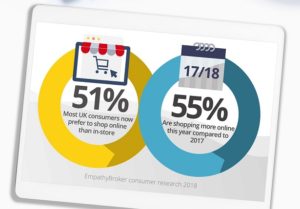 Ecommerce is continuing to charge the high street as over half of UK consumers (51%) admit they now prefer to shop online than in-store. The research by eCommerce search and navigation specialists EmpathyBroker found that 55% also said that they are shopping more online this year compared to 2017.
Ecommerce is continuing to charge the high street as over half of UK consumers (51%) admit they now prefer to shop online than in-store. The research by eCommerce search and navigation specialists EmpathyBroker found that 55% also said that they are shopping more online this year compared to 2017.
Key findings:
- 55% of UK consumers are shopping more online this year compared to 2017; on average six times per month.
- Only 13% of consumers said they have an exact product in mind ‘every time’ they shop online.
- Almost two thirds (65%) of UK consumers like to browse or have a general look around a website ‘a lot of the time’ or ‘every time.’
- A third (33%) of UK consumers are looking to brands for inspiration or suggestions about the latest trends when shopping online.
The regular consumer shops online on average six times per month, with 25-34-year olds the most active, shopping on a retailer’s website eight times a month. The study also showed similarities between the sexes with 27% of men and 25% of women shopping online once a week. Londoners are the most active online shoppers in England, indulging in eCommerce retail therapy on average seven days per month.
The research by eCommerce search and navigation specialists EmpathyBroker also delves into the psychology of shoppers and the opportunity presented to brands to capitalise on consumers through their website experience. When asked separately how often the following statements applied to them when visiting a website, only 13% of consumers knew exactly what product they want to buy every time they visit an eCommerce website with 42% saying only some of the time.
Almost two thirds of shoppers (65%) like to have a browse or general look around every time or a lot of the time they shop, and online stores are also increasingly becoming a source for shopping inspiration. A third of all consumers (33%) look for brands to suggest product options or give tips about the latest trends every time or a lot of the time they visit a site. This may explain why 2 in 5 people (43%) said they were more likely to make an unexpected purchase online than in-store.
 Angel Maldonado, Founder of eCommerce search and navigation experts EmpathyBroker, said: “As we see more and more consumers going online, and more frequently, this presents a great opportunity for eCommerce retailers but it also means more than ever they need to get the digital experience right. Creating more memorable online experiences not only generates sales, it creates emotion, brand connection and loyalty. It’s no longer enough to offer great products or have the coolest store. It helps, yes, but in the end, it all comes back to emotions, to making people feel unique and special. Smart retailers are thinking more about people, relationships and creating memorable and joyful digital experiences.”
Angel Maldonado, Founder of eCommerce search and navigation experts EmpathyBroker, said: “As we see more and more consumers going online, and more frequently, this presents a great opportunity for eCommerce retailers but it also means more than ever they need to get the digital experience right. Creating more memorable online experiences not only generates sales, it creates emotion, brand connection and loyalty. It’s no longer enough to offer great products or have the coolest store. It helps, yes, but in the end, it all comes back to emotions, to making people feel unique and special. Smart retailers are thinking more about people, relationships and creating memorable and joyful digital experiences.”
The research also revealed that after the cost of the product (58%), free delivery and return options (57%), the search function (29%) was the third most important aspect for consumers when choosing to shop on one website over another.
61% of consumers use the search option every time or a lot of the time when shopping online, with the research also finding that the quality of a website’s search function directly affects the number of sales. In fact, 63% of consumers said they are less likely to make a purchase if the site search isn’t good and they can’t find what they’re looking for.
Maldonado added: “The search function is becoming increasingly important, and not just as a tool to find something specific but also as a means of inspiration. Moments of joy in digital are real. They can be achieved when we’re pleasantly surprised by something that fulfils our goals, whether that’s something we’re actively looking for or not. The search box creates rich interactions, helping brands to engage with consumers, and deliver a more enjoyable and meaningful experience that leaves a lasting impression.”
Consumer research conducted by Censuswide among 3,000 adults in the UK and Spain in June 2018.
Source: Net Imperative

You must be logged in to post a comment Login